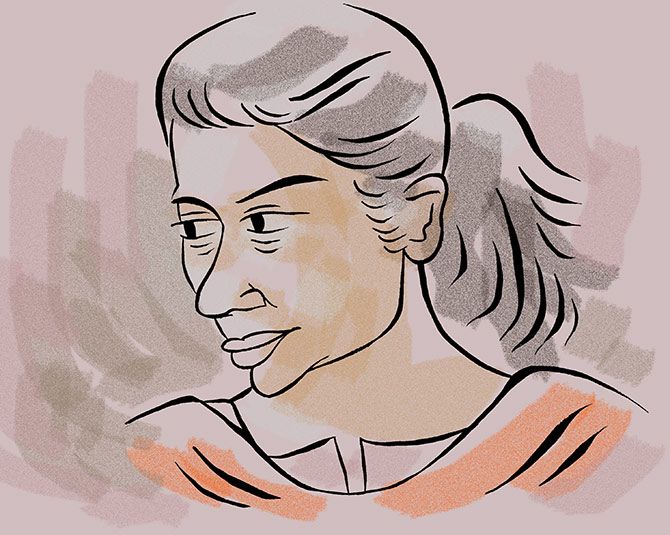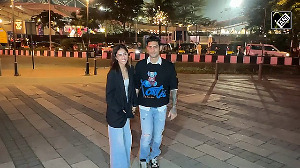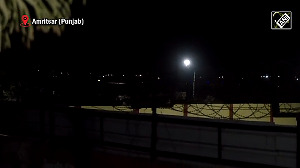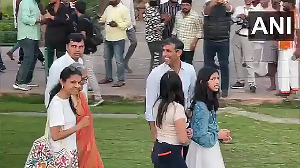TRPs have a better affinity for Karti Chidambaram and his alleged timely assistance to INX Media, the company Peter and Indrani once ran, than the more recent murder of a 25-year-old woman.
Vaihayasi Pande Daniel reports from the Sheena Bora murder trial.
Illustration: Uttam Ghosh/Rediff.com

A baldish, bespectacled, advocate repeatedly attempted to interrupt proceedings in the Sheena Bora murder trial on Monday, March 5, in CBI Special Courtroom 51 at the city civil and sessions court, south Mumbai.
He was ultimately successful.
The cross examination of police Inspector Ganesh Dalvi, who allegedly first arrested the Mukerjeas' driver Shyamvar Pinturam Rai and brought him to the Khar police station, north west Mumbai, in August 2015, was underway.
This elderly lawyer first made repeated trips to the legal clerks' desk, next to the judge, seeking certain information.
After that he began to persistently hover behind Sudeep Pasbola, Indrani Mukerjea's trial lawyer, as he interrogated Dalvi.
Judge Jayendra Chandrasen Jagdale noticed him too, but, with a laugh, ignored him for a while.
It was a broiling post-Holi afternoon. The first of the summer's heat was making itself sharply felt. And no one was accustomed to it.
The courtroom was packed. Tempers were not at their best.
CBI Special Prosecutor Bharat Badami hissed at the obstinate lawyer, "Don't disturb us!" and scowled fiercely.
The pushy advocate didn't budge, calmly waiting for a chance to cut in, indicating that he knew it would be perfectly acceptable for him to do so.
Finally when there was a lull in the cross examination, the judge summoned him and he brought in Vivek Maheshwari, a Delhi investigator from the enforcement directorate.
Abruptly the room lost its post-prandial lethargy. Levels of attentiveness quickly peaked.
In the accused box, Indrani Mukerjea, summery cool in a pale pink chikan sleeveless kurta, teamed with an orange-red chunni and salwar, looked up from her note-taking and glanced curiously across at her co-accused -- husband Peter Mukerjea and former husband Sanjeev Khanna.
Maheshwari and his colleague, through the lawyer, petitioned the judge for time to interrogate Peter Mukerjea, the next day and the following day at the Arthur Road jail, central Mumbai.
It was granted.
That saw a few journalists speed out of the room to deliver this information up as breaking news.
The number of journalists, especially television reporters, in the courtroom on Monday was up considerably since the last hearing in this trial.
Ironically, but not surprisingly, TRPs have a better affinity for Karti Chidambaram and his alleged timely assistance in 2007 to INX Media, the company Peter and Indrani once ran, in bringing into the country Rs 305 crores (Rs 3.05 billion) investment, than the more recent murder of a 25-year-old woman.
Court processes in a murder trial also momentarily paused for ED business, just as the ED lawyer knew it would.
The sessions court building, which is even more dilapidated and dusty these days as bouts of construction proceed, was abuzz with much more than its usual quota of media on Monday.
They made feverish dashes between the Sheena Bora murder trial on the third floor, Judge S R Tamboli's courtroom 47, one floor below, where bail applications of the accused in the Nirav Modi scam were being heard and the Sohrabuddin Sheikh trial down the hall in courtoom 49.
The usually quiet corridors of the court were electric with activity. Vipul Ambani, the chief financial officer of Firestar Diamonds, wearing a white and black striped shirt, was brought into the packed courtroom, from police custody rather late.
The other accused and their families lined the length of the corridor. Conversations meandered between the basic needs of the accused and how they would use their time in custody -- meditation being one of the options.
Outside the court, numerous television channels had set up their camera stations in anticipation of harvesting a major crop of soundbytes by the end of the day.
The hearing in Courtroom 51 was off to a fiery start.
Judge Jagdale roared at the lawyers of the accused for not moving ahead with the next segment of the witness cross examination.
"For two-and-a-half years people have been sitting in jail. It is not only my anxiety. The Supreme Court has passed an order (for expedition of cases). You should have the same anxiety! You have asked for the log book. It is here..."
Judge Jagdale was pacified and told Pasbola would shortly be along to begin Dalvi's cross examination.
The judge has been meticulous in his efforts to speed up the pace of the trial ever since he took it over mid-last year. But at times the odds are simply stacked against it, no matter how untiring his efforts.
Monday's hearing was the first after a long series of adjournments for reasons frustratingly beyond the judge's control. Republic Day bandobast meant Dalvi could not make an appearance in a hearing scheduled a few days before January 26.
The CBI court was open on Shivratri, but hearings could not happen because lower courts were closed for the festival.
When the senior lawyer finally arrived to start the cross-examination, the judge gave a happy chortle of approval.
But then an argument ensued between him and Pasbola.
Irked by the prosecution's procrastinations, Indrani's advocate put it to the judge that he would have difficulty moving ahead if he didn't receive Rai's phone instrument.
The cellphone that Rai was carrying at the time of his arrest had been requested for more than a month ago.
Producing the handset was vital to the defence ever since they had accused Rai of a cooperation agreement with the Khar police long, before the date of his arrest and that his arrest for possession of a country-made katta, cartoos (cartridges) was a sham.
Judge Jagdale, exasperated: "I am not insisting you finish the cross examination. Open it!"
Pasbola: "Absolutely. But why not call for it immediately? Why not, Sir, get the phone immediately?"
Judge Jagdale: "The cross examination is not confined to that piece of equipment! You will no doubt get a chance for that."
Pasbola persisted: "But why not call for that mobile phone?"
Judge Jagdale: "Is your grievance only that? That can be done!"
Pasbola: "I am grateful. My requirement is for you to pass an order on that. Why not today?"
Judge Jagdale: "I will pass an order."
Pasbola: "The manner in which evidence is being tampered with. Each and every article goes away from the court."
This intense war of words -- that often erupts between this judge and this lawyer -- actually cleared up the issues at stake swiftly. The interactions between Pasbola and Judge Jagdale always have clean lines to them. They seem to share special courtroom rapport.
Pasbola will thunder, even as he dilutes his blistering statements, with the obligatory "with all due respects" and "Yes sir."
The judge will thunder back. Then both will climb down very quickly, smile and oblige each other politely.
Dalvi's cross examination then proceeded ahead. Not exactly smoothly. It limped. Floundered. Lost its way at times. It was totally short on colour. And excitement.
The tone Pasbola chose for Dalvi seemed to be tougher than even what he had bombarded Rai with at many points last year, during the driver's lengthy stint in the witness box.
And there were no bouts of wheedling or cajoling, or politeness for Dalvi, that Pasbola resorted to, out of puzzled or amused vexation, while cross examining Rai, who had turned approver in the case.
With Dalvi, Pasbola simply barked, hoping to hammer the truth out of the young, clear-eyed, inspector, even while he seemed to be trying to establish his authority.
His decibels kept rising even as the answers he got back were more and more routine.
Dalvi, in response, was cool as cucumber, in his khaki uniform, a pistol in his belt, his police hat placed on the shelf in front, smartly saluting the judge every time he stepped into the witness box and out of it.
Nothing Pasbola said to him had an effect. Flamboyance was not part of Dalvi's skill set. Astuteness perhaps was.
He mostly evenly answered every staccato query with a simple no or a yes, divulging not a single extra detail.
Dalvi, who joined the police force in 2013 and is not very many summers old, portrayed himself as an obedient, order-abiding cop, who was simply doing his job and that purely officialdom had guided his moves and the course of events and they were not authored by him.
It emerged that the FIR Dalvi filed against Rai for possession of an illegal weapon was the only FIR he had filed till date.
He also said he had been questioned by the CBI when Investigating Officer K K Singh had come to the Khar police station to question him for 1.5 hours to 2 hours, the dates of which he was uncertain.
He said the CBI diary had not asked for the station diary (that keeps track of a police station's activities per diem).
He also said, unbelievably that, though he was assisting the investigation officer Inspector Dinesh Kadam in the arms case against Rai, he did not know when the chargesheet had been filed.
Nor did he see Rai's cell phone after August 2015 or know of its whereabouts after that or if its call records had been examined.
His answers were often so bland, and as colourless as a Holi without gulal, that a couple of the key lawyers promptly nodded off to sleep, the shooting mercury no doubt an additional catalyst.
The attendance of lawyers present in Courtroom 51 on Monday was abnormally high. Instead of finding the excitement in the proceeding that they had expected after the recent splash of headlines, they were stupefied into somnolence by the dullness of the cross examination.
At the back of the courtroom, the accused had a difficult time catching the stream of the arguments, especially since they didn't seem to have an abundant grasp of Marathi.
Pasbola addressed Dalvi in loud Marathi and Dalvi replied in low Marathi monosyllables and the judge translated to the steno, for the court record, in even lower-pitched English that made your ears tickle painfully in your pursuit to catch the entire conversation.
Net result: Much of the proceedings were swallowed up by noise, murmurings from extraneous side conversations, the suffocating heat and the whir of the fans.
Pasbola kept requesting Dalvi to speak up louder.
Badami would intervene, jumping loyally to Dalvi's defence: "His sound box is not as powerful as yours!"
Pasbola: "But mahinat toh karna chahiye! (Let him labour at it!)"
The cross examination of Dalvi finally dwelled on a certain communication the Khar police station had with the Pen police station, outside Mumbai in Raigad district, where Sheena's alleged remains were found, for which the inspector said dates were unknown.
Yet Pasbola was certain the dates were known because the station diary for the appropriate dates had been requested.
While he explained this angle to the judge, Dalvi was requested to step out of the room.
That caused Badami to comment that he could not remove the only prosecution witness from the room. Prosecution attendance was slim on Monday with the peripatetic K K Singh's time being claimed by a Ranchi court this week, where he was giving evidence in the Lalu Prasad Yadav fodder scam case.
Pasbola explained that he needed an improvement in this information. He requested Judge Jagdale's permission to ask for a copy of the communication between the Khar and Pen police stations.
The hearing ended with the defence writing an application for this document and the prosecution writing an application to counter its need.
When Indrani swept out of the courtroom and sat on the wooden bench outside to have -- much to the impatience of her women police escort -- a long and urgent consultation with her lawyers, her first likely since her last headline-breaking interrogation by the enforcement directorate, she was peppered with questions about her interactions with the ED.
She politely said she would speak when the need arose.
Downstairs, where the processing of justice was at a much more nascent stage, the relatives of six accused in the Nirav Modi case were relieved to have them transferred from the more rigorous police custody to judicial custody till March 19. Vipul Ambani's lawyers filed an application for home food and a better mattress.
In spite of unrelenting police escort requests to get going, Indrani and Peter spent nearly 45 minutes talking to their entire battery of lawyers before heading back to jail.
The next hearing is set for March 12.











 © 2025
© 2025